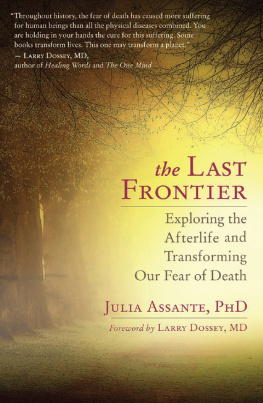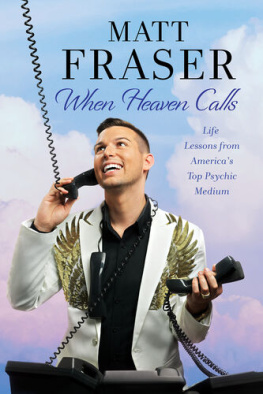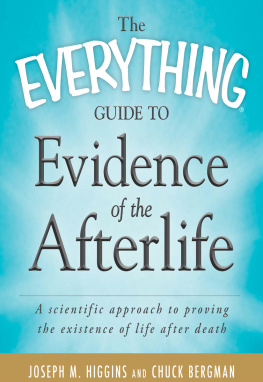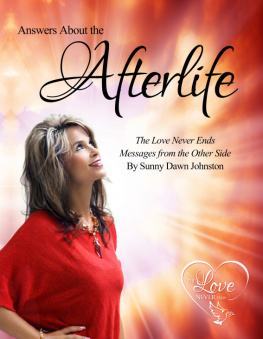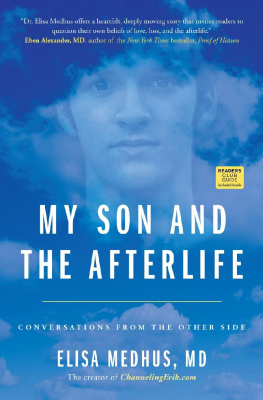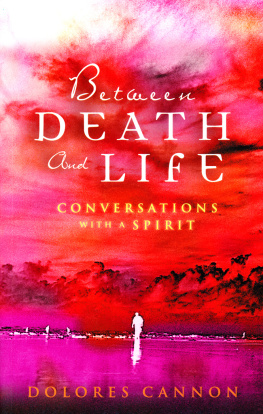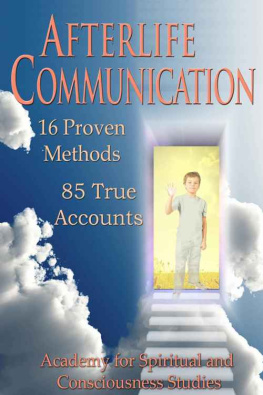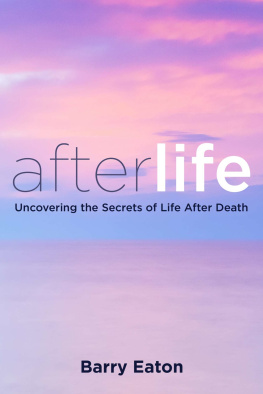DEDICATION:
TO ALL YOU WHO FEAR DEATH.
MAY THIS WORK HELP YOU TO REALIZE THAT LIFE, ONCE GIVEN, CAN NEVER BE TAKEN AWAY.
STERLING and the distinctive Sterling logo are registered trademarks of Sterling Publishing Co., Inc.
Library of Congress Cataloging-in-Publication Data
Hamilton-Parker, Craig.
What to do when you are dead: living better in the afterlife / Craig Hamilton-Parker.
p. cm.
Originally published: c2001. With no illustrations.
Includes bibliographical references (p. ).
ISBN 978-1-4027-7660-1
1. Future life. I. Title.
BL535.H36 2010
133.901'3--dc22
2010018991
10 9 8 7 6 5 4 3 2 1
This 2010 edition published by Sterling Publishing Co., Inc.
387 Park Avenue South, New York, NY 10016
Originally published in 2001 by Sterling Publishing Co., Inc.
2001 by Craig Hamilton-Parker
Distributed in Canada by Sterling Publishing
c/o Canadian Manda Group, 165 Dufferin Street
Toronto, Ontario, Canada M6K 3H6
Distributed in the United Kingdom by GMC Distribution Services
Castle Place, 166 High Street, Lewes, East Sussex, England BN7 1XU
Distributed in Australia by Capricorn Link (Australia) Pty. Ltd.
P.O. Box 704, Windsor, NSW 2756, Australia
Manufactured in the United States of America
All rights reserved
Sterling ISBN 978-1-4027-7660-1
For information about custom editions, special sales, premium and corporate purchases, please contact Sterling Special Sales Department at 800-805-5489 or specialsales@sterlingpublishing.com.
Death is nothing at all. I have only slipped away into the next room. I am I and you are you. Whatever we were to each other, that we are still.
Call me by my old familiar name; speak to me in the easy way which you always used; put no difference in your tone; wear no forced air of solemnity or sorrow; laugh, as we always laughed at the little jokes we enjoyed together; pray, smile, think of me, pray for me; let my name be ever the household word that it always was; let it be spoken without effect, without the trace of a shadow on it.
Life means all that it ever meant; it is the same as it ever was; there is unbroken continuity. Why should I be out of mind because I am out of sight? I am waiting for you, for an interval, somewhere very nearJust around the corner. All is well.
Henry Scott Holland

THERE IS ANOTHER SHORE BEYOND the horizon of physical life. It is not a great unknown, as it has been visited by many spiritual travelers from our world. On their return, they have related strange stories that fill us with awe, much as did the tales of explorers when they first traveled the seas to Australia or the Americas. Some have journeyed to this place during sleep, while critically ill, or under hypnosis. Others have traveled there during meditation or a mediumistic trance, or by using techniques that enable the soul to travel outside the physical body.
Believers in this other shore usually live better lives. Even if some do not profess it philosophically, they may still have the feeling that that shore exists. A voice deep within tells them it is the truth. A person who believes in or, even better, has actually experienced the afterlife has a completely different outlook on this life to that of the materialist. Knowledge of a next world brings with it a strong sense of personal responsibility and morality. A person who knows theres an afterlife realizes that the immortal human spirit is here for a greater purpose than just accumulating possessions, status, fame, or power. In contrast, those with no belief in an afterlife tend to create a society fixated on short-term results, without much thought for the consequences of their actions. To the believer in an afterlife, it is apparent that life is an opportunity to grow by enhancing the souls capacity to give and receive love. Life gives us the chance to change ourselves and to understand the purpose of existence. Those who acknowledge the world of the spirit are more likely to take personal responsibility for their lives and live to a higher moral standard than those who dont.
Could it be that the problems of our time are a result of our forgetting the knowledge of the afterlife? Would we still have the urge to accumulate earthly things or to strip the worlds resources for short-term profits if we knew for certain that we would pass this way again? Supposing we knew, as fact, that every action we take will affect our future and come back to us like a cosmic boomerang. Would we then be so keen to cause others pain or plot for selfish gain?
What a utopia we could enjoy if the majority of people here and now recognized that we are only the temporary custodians of this world. Even our human bodies are made from the dust of stars that burned out millennia ago. Dust to dust to dust. No, the transitory things of the world cannot give long-term support. They will all pass away, even the giant sequoia and the deepest ocean. But the things of the material world are as nothing compared to the everlasting spirit. Its pristine light is our true reality.
Many people live out their lives avoiding the dark thoughts of death. It is simply too frightening to contemplate. Death shatters everything. Up to the very last moment, most people refuse to face death. When my father, for example, was diagnosed as terminally ill with bone cancer, nobody in the family would even mention the word death to him. My father steadfastly refused to accept that he would soon die and fought a tragic battle to the end. It brought to my mind the words of the poet Dylan Thomas: Do not go gentle into that good night, / Old age should burn and rave at close of day; / Rage, rage against the dying of the light.
If we lose someone close to us, it brings thoughts of our own mortality. When our parents die, we know that were in the next wave, said a friend my age. It brings home the fact that death comes to us all. Nonetheless, if we examine our innermost feelings, we may admit to an innate knowing that there is something else after death. A voice, a whisper, somewhere deep inside, says, Dont worry about death. Everything will be all right.
I am fortunate in that I know that little inner voice is right. I have amassed too much evidence to believe otherwise.
Its Life, Jim, but not as we know it.
LEONARD NIMOY (AS MR. SPOCK, Star Trek)

ONE FOOT IN HEAVEN
I am a mental medium. The adjective mental distinguishes those mediums who bring messages from the next world from those who produce physical phenomena such as voices, lights, levitation, or the manifestation of ectoplasmic figures. A mental mediums job is to provide verifiable evidence of human survival after death through information from the spirit world. Some of this information reveals what life is like in the afterlife. The material received from spirit communicators via mental mediumship is the cornerstone of this book.
A medium must always strive for accuracy and not give vague statements that could apply to just about anyone. Plenty of people spout psychobabble, but much of it can be quickly recognized as foolish fantasy. A good medium will always strive to provide clear and verifiable detail. Only if the mediumship is good can we trust that the information given about the afterlife deriving from it is also accurate. What you will read here is not fantasy or material simply arising from the unconscious. It has come during mediumship from spirits who have proven their identity to the sitters. Also included is information derived from yogis, metaphysical thinkers, and mediums of the past.



